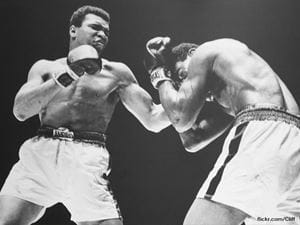
President of the Ahmadiyya Muslim Youth Association, Dr. Bilal Rana, spoke exclusively with Beliefnet on how the passing of Muhammad Ali affected the Muslim community, especially the youth. Dr. Rana is the leader of the oldest Muslim youth organization in the United States and works closely with the Muslim youth. Muhammad Ali was a prominent figure in the Muslim community and had a important and special impact on those who looked up to him.
1. What is your first recollection of Muhammad Ali?
"I was a child less than 10 years old in the 1980s and my father, a devout Pakistan immigrant Muslim, was telling me about how he was a champion athlete and a Muslim. At that time, that combination was extremely rare, if not completely non-existent. I had no idea at the time that from that moment until the time that I write this, that the first Muslim athlete to rise to prominence in America, would also be it's greatest."
2. Muslim Americans around the country are deeply mourning the loss of Muhammad Ali. What did he symbolize to your community and for what reasons?
"His discipline and dedication to his sport were no doubt noble qualities, but he'd have been no hero to us if he was just a boxing champion. He was a champion for our reputation and right to be recognized as Americans just like anyone else. And he did it so well. Though he was questioned, judged, perhaps even hated at first, we later came to love and adore him as we begin to understand him."
3. How did Muhammad Ali bring attention to the Muslim religion/faith? How influential was he?
"Muhammad Ali was in no way shy or private about his beliefs and his conscience. There have been a handful of successful and devout Muslim athletes since Muhammad Ali in American sports, but none that attracted the publicity and attention of the country. He would speak about Islam on television and radio, and his speech as very captivating and so honest that it was hard to disagree with him. Finally, Muslims had a voice that was fully passionate and fully American at the same time which had been missing for so long."
4. What legacy does he leave behind in the Muslim community?
"He leaves a legacy of faith, professional excellence, bravery, and through his illness a legacy of grace and patience."
5. Can you talk a little more about AMYA and your role? How does the association meet the needs of the young Muslim community?
"The AMYA is the oldest Muslim youth (or young mens) association in the country, pre-dating Ali's birth by a few years with our inception in 1939. We have chapters in 70 metropolitan areas around the country, and have a membership which approaches 5,000 members. Every year we have an annual meeting where we compete with one another in both religious training (speeches, Quranic knowledge, etc) and in sports (basketball, cricket, volleyball, etc.). The goal of our group is to instill the Islamic values of loyalty to our faith, our nation, and our families starting at an early age."
6. How did the young men of AMYA respond when they learned of Muhammad Ali’s passing?
"First of all, we recognize he is only a man. He's a role model in many ways, but we have many role models in our community. Ali however was a national and international figure, beloved by all Muslims of all sects and countries. Our youth immediately took to reminiscing about his life, sharing his memorable quotes with one another, and taking the conversation to social media. We issued a public statement extending condolences to his family and joining the nation in mourning one of our beloved fellow Muslim Americans."
7. How did Muhammad Ali’s influence transcend boxing?
"Two turning points in the life of Muhammad Ali really seem to project his character outside the ring. First, his conversation to the Nation of Islam, a controversial sect at the time, followed by a his later conversation to mainstream Islam. This brought a lot of attention as he began speaking of finding a new faith and took on a new name, leaving behind "Cassius Clay". Secondly, his protest and defiance of the Vietnam War and it's draft which landing him in jail and took away his heavy weight title for 3 of his best years in boxing. Agree with him or not, there's a valuable lesson to learn for all youth in sports and that is that no sport is larger than the life an athlete lives -- his beliefs and principles. If only athletes today would reflect on this."
8. Muhammad Ali was the inspiration for a generation, inspiring so many people to fulfill their potential. How does Muhammad Ali continue to inspire AMYA? Muhammad Ali wrote in his 2004 memoir, The Soul of a Butterfly “I would like to be remembered as a man who won the heavyweight title three times, who was humorous and who treating everyone right. As a man who never looked down on those who looked up to him, and who helped as many people as he could. As a man who stood up for his beliefs no matter what. As a man who tried to unite all humankind through faith and love…” How will you remember Muhammad Ali?
"I will remember him as inspirational personality who had the kind of charisma that would bring people together, and the personal character that charmed so many people and endeared them things once stranger to them whether that related to race, religion or political beliefs."

